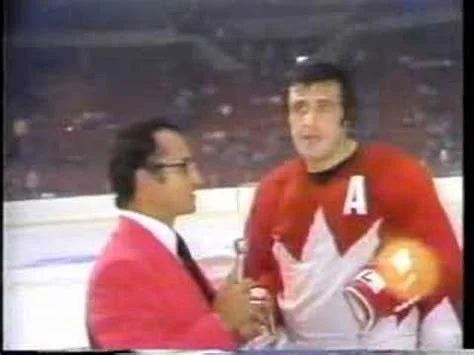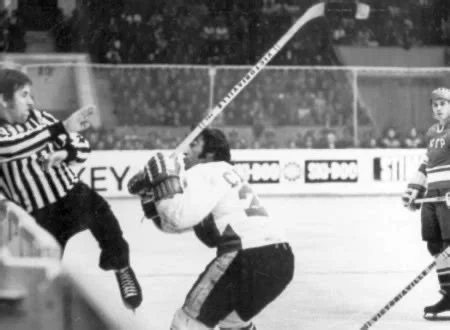Dramatic? Yes. But 1972 Was Not The Greatest Hockey Ever
Sign up today for Not The Public Broadcaster newsletters. Hot takes/ cool slants on sports and current affairs. Have the latest columns delivered to your mail box. Tell your friends to join, too. Always provocative, always independent.
One of the advantages of being alive for an extended period is how you develop a filter for propaganda. Experiencing seminal sports events in real time affords the ability to separate hype from history. Perhaps the greatest sports events for Canadians of a certain age were those in September 1972, when— as a first-year student at U of Toronto— we cut classes to watch the national mental trauma of The Showdown Series.
Even 50 years after the emotional tumult of Canada/ USSR, it’s fair to say that it was a drama unlike any other. It legitimized International hockey competition. In an age when a 36-inch TV was a luxury, hockey sticks were made of wood and Foster Hewitt was still semi-coherent the eight-game matchup between Canada’s top NHL stars and the “amateurs” of the Soviet Union delivered as a clash of cultures. Many who weren’t there call it the greatest hockey ever played.
The greatest hockey ever? Certainly the Soviets played their best. But the Slap Shot quality of Canada’s winning effort could not hold a candle to the 1987 Canada Cup squad that beat a Soviet team in a three-game final as the USSR was collapsing. Without Bobby Orr, Bobby Hull and Gerry Cheevers in the 1972 lineup— and lulled into complacency by homer media— Team Canada squandered its obvious advantages by arriving out of shape for Game 1.
Neither were they prepared mentally for the political consequences of eight games on two continents over 26 days in September. How high were tempers s and how damning the criticism? The late Rod Gilbert’s own brother called him “a disgrace” after Canada suffered an embarrassing 7-3 defeat in the opener. While time has soothed frayed tempers the Summit Series was not Canada at its best psychologically. To be blunt, Canada’s top stars were their often own worst enemies when adversity appeared.
That’s been largely forgotten today as fans smooth out the team’s rough edges. Perhaps the best example of revisionism was Phil Esposito’s pouting, whiny screed after Canada lost Game 4 in Vancouver. Espo was pure entitlement, demanding that fans ignore the ill-tempered, slap-dash attitude of their heroes. While sycophantic journalists have re-fashioned the Johnny Esaw interview as a call to arms, it was more like a put-upon call to Canadians for pity.
Almost as egregious was the deliberate injuring of Soviet star Valeri Kharlamov, the speedy winger (think Pavel Bure) who had destroyed Canada with his skill. And so Bobby Clarke went full Ogie Ogelthorpe , breaking Kharlamov’s ankle in Game 6 with a cynical slash. Kharlamov tried to continue, but he was done as a factor in the remaining games. (Years later series star Paul Henderson admitted, “I really don't think any part of that should ever be in the game.”
Then there was the late Jean Paul Parisé’s intimidating assault on controversial referee Josef Kompalla in Game 8. Frustrated about calls in the final game, Parisé charged at Kompalla with his stick raised. Just before he brought the stick down on Kompalla he pulled back. Parisé was ejected, but it proved an ugly moment mitigated only by Henderson’s later heroics.
To say nothing of Alan Eagleson’s obstreperous behaviour skittering across the ice with a raised finger after reportedly escaping the KGB.He was matched by Bill Goldsworthy’s raised finger at Game 8’s end. Espo’s repeated “choke” signs at bemused Soviets. Or the four Canadian players who jumped ship before the series switched to Moscow. It was high drama. The greatest hockey? No.
Thanks to Canada’s globalist PM Pierre Trudeau, Canada was looking to break its image as an imperial chattel of Great Britain. The series was a springboard to that for many. But Canada had to win. My friend Bob Lewis, who covered the series for Time magazine, is excellent in the Icebreaker documentary at presenting the trauma for a vulnerable Canada. The country headed for a federal election in October wondering how a defeat might hurt Trudeau’s chances. (The win didn’t keep Trudeau from losing his majority.)
The 50th anniversary, like previous anniversaries of the 1972 series, has produced documentaries and films reliving the moments with surviving players and journalists who were there in the flesh. While neither CBC’s four-part series Summit 1972 nor Icebreaker: The ‘72 Canada Soviet Summit Series breaks any new ground on the Cold War climate, they do serve as a reminder to anyone born after the Series of the cultural impact of the showdown with a feared nuclear rival. And it uses the latest technology to clean up video and audio that was being lost to time.
The principal difference between the two productions— besides length— is the scoreboard of which players on the two teams appear in each documentary. Who gets Ken Dryden? Who nails down Phil Esposito? Who gets Vladislav Tretiak? The greatest impression is the age of the surviving men now (10 Team Canada members have passed away) who look more like WW II vets than hockey heroes.
Sadly, the producers of Icebreaker also include extensive interviews with convicted felon Alan Eagleson, who stole the glory from Joe Krycka and Fred Page of the Canadian Amateur Hockey Association who originally negotiated the series. The corrupt Toronto lawyer then pushed them aside in his position as player agent and NHL Players Association director. Yes, he was part of the series, but allowing him to restore his integrity via a starring role in this documentary makes for tough watching.
So for those beleaguered by a modern world, the 1972 retellings will be a balm with a happy ending— like when Esposito met noted USSR hockey fan and cold-blooded dictator Vladimir Putin years later. “Mr. Esposito, I thought you hated all Russians,” Putin remarked. “Mr. Putin, I did until my daughter married one,” Esposito replied.
For others it might fill in the stories told by now-deceased relatives and friends who saw it all. And for aging Boomers, whose proxy was carried by Team Canada 1972, the throwback will be a reminder that something of worth more than bell bottoms and sideburns emerged from their glory days.
Bruce Dowbiggin @dowbboy is the editor of Not The Public Broadcaster (http://www.notthepublicbroadcaster.com). A two-time winner of the Gemini Award as Canada's top television sports broadcaster, he’s a regular contributor to Sirius XM Canada Talks Ch. 167. Inexact Science: The Six Most Compelling Draft YearsIn NHL History, , his new book with his son Evan, was voted the eighth best professional hockey book of by bookauthority.org . His 2004 book Money Players was voted seventh best, and is available via http://brucedowbigginbooks.ca/book-personalaccount.aspx



